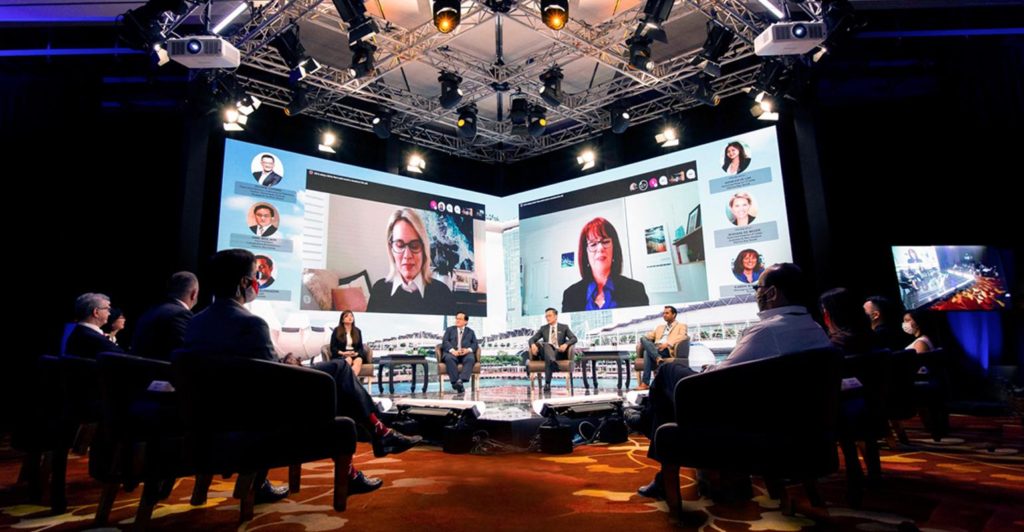Maximize the Results of Your Event
Our Ideas for Event Planning can provide you with some guidelines for improving the results of your workshop, seminar, or conference.
We know that organizing an event for yourself, for your company or for third parties is an exhausting process filled with all kinds of details. For this reason, we offer you some basic tips that we hope will help you to make the task easier and increase the changes of a successful result.
Please note that although this article is mainly aimed at business and commercial event planners, with a little creativity, most of the tips also apply to the organization of social events, such as weddings, family and high-school reunions, or office celebrations.
Start planning your event early

If you’re organizing an event for a department in a company, anticipation shouldn’t be a problem, especially if your boss “contributes” by forcing everyone to attend.
However, when the focus of the event you’re planning is a lesser-known audience, then you face new and different challenges. In addition to the normal planning details involved in an internal event, you will probably have to deal with some type of marketing or advertising.
Try to start planning approximately 4 to 6 months in advance, depending on whether your event will last several days or if guests are expected to make an economic investment. Keep in mind that paid events or longer sessions will require more planning on the part of attendees as well.
If your event is taking place in a different country, regardless of your familiarity with the chosen location, and especially if you intend to sell conference tickets, it is crucial to approach the planning process with patience and realism. It is advisable to commence your preparations at least six months in advance, and ideally, a full year ahead of time.
What should my event look like?
Successful event planning, one in which attendees are impressed and enjoy not only the content but also the organization, should be planned more like a show than a conference.
Go ahead, dare to be original! It doesn’t really matter if your event is about finance, customer service or a motivational talk, you can IMPRESS your audience with your extraordinary event planning. And as an organizer, your goal should always be to WOW!!!
There are as many types of events as there are companies and individuals, and your event planning must be adapted accordingly. Just remember that the easiest way to get attendees walking around the conference center or glued to their cell phones during the sessions is to squeeze 10 formal PowerPoint presentations from 9 to 5. You can do much better than that!
So, start organizing your event by writing a “script” of what you want to offer. Think of a general topic, estimate how much time you’ll need to welcome your guests, warm up the audience, offer the key lessons of each session, and give participants enough time to process the information, and exchange the ideas nourished by your message.

Don’t be shy when it comes to decoration, banners, advertising, and materials for the audience! Deliver materials that are worth keeping! They will continue selling on your behalf for a long time.
Regardless of the composition of your audience (staff from a department or a random group of attendees), include in your organization some outreach activities, icebreakers, teamwork exercises, and others. You’ll be surprised to see how people enjoy these activities and how quickly a group of strangers begins to work together and share their ideas.
Bring out the child in your audience! Ask a musical consultant to organize an improvised percussion piece with the help of the audience, warm up the room with a pleasant musical show, teach your audience stretching exercises at the start of the morning, there is always something special and appropriate that you can do with your group!
Or you can be really daring… get rid of all the lectures, yes, all of them, and prepare an interview show with different sessions and participants moderated by an expert in the field… Now that’s fun and learning at the same time!
In first five minutes you can tell if a film is about horror, cowboys or romance. Your audience can also determine in a few minutes if your event will be a lasting and pleasant memory or just one more of the bunch… and they will certainly give back accordingly!
How soon do I need to start sending out invitations?
As soon as possible. In general, the event planner should consider at least two months to start sending the first formal communication if their audience is local, and up to six months or more if the organization of their event intends to bring together an international group.
To break the ice, start telling everyone about your event as soon as possible — even if you do it informally — so you can start capturing people’s interest and getting them to want more information. Not having the final date is no excuse to take advantage of social networks. Prepare some attractive materials and build expectation.
When organizing your event involves international travel, you should think about sending your invitations well in advance. People are unlikely to set everything aside to travel around the world with just a few weeks’ notice. For international events, you must give your audience at least 4 months’ notice to make decisions and start planning. Six months or even one year should not be considered too much time.

Also, when your event requires financial investment from participants, you should give them enough time to allocate the funds or to request them from different parties or departments in your organization. So, 6 to 9 months is also considered a good guideline.
Another important aspect to consider is how much time you expect the audience to spend on your event. It will be easier for people to find the time to attend a 5-8pm conference or workshop than to register for a one-week training camp. So, again, allow at least 4 months for people to adjust their schedule.
How much can I charge for my event?
Plan to do some market research. Look at what the competition is doing, how much are they charging? How much do your potential customers normally pay?
Can you handle a price like theirs or do you need to charge more, or maybe you can charge less?
If you’re new to the event planning business, you might be tempted to charge less to attract more people. However, you should be careful when setting your price, because too low can also indicate to your guests that your event isn’t that great. Another drawback is that in the future it may be more difficult for you to justify an increase in your rates to match the competition.
Also, if price is the only reason your guests choose your event over that of the competition, a well-established competitor can easily lower their prices and take you off of the market.
A quality event comes at a price, no matter if it’s your first or number one hundred! So, try to offer good materials and present them in a fun and entertaining way and the price will work-out itself.
Experts tell us that some good ways to demonstrate the quality of your event are:
- Use case studies and testimonials to demonstrate the type of results it provides.
- Use your experience to convince your prospects that you are THE subject matter expert.
- Guarantee your results. Although it sounds very risky, for many reasons this is the right method. It can help you attract groups that might not have taken risks with you in the first place.
- Bring a guest speaker who is better recognized in the market than you.
Ideas for Choosing the Event Venue
Choosing the venue for your event is an important decision in organizing events. First, the location should be convenient for your guests. If you are thinking of an exotic destination, then you should also consider transportation and/or lodging options for attendees.

The venue you choose should also be well suited to your budget and the type of event you offer. A very elegant and expensive place could force you to charge a very high price or to allocate a budget that is too high for an event that may not be worth the investment. The secret of organizing events is to find pleasant places where you can offer an excellent event for a reasonable price and with all the conveniences.
However, there are always important aspects to consider. The venue should be large enough to serve your audience, perhaps even larger than necessary so you can accommodate last minute guests.
Make sure there’s enough parking for all your guests or consider valet parking if the parking lot isn’t conveniently located relative to the conference room.
The place should offer a pleasant atmosphere, not too old, not too old fashioned, should smell good and look attractive and relaxing.
You should avoid bustling or crowded places. Your audience deserves a quiet environment in which to work and learn.
If your event organization includes food, you must ensure that the food is good and served in adequate quantities. You don’t want your guests to go hungry during your event or walk all over the place looking for snacks to compensate for the scarce meals. However, you shouldn’t overfeed your attendees either because you risk them falling asleep during sessions.
Basically, you should use your common sense. Visit the possible locations in advance and think… would I like to spend several hours in this place? Would you be willing to pay x amount of money to work in here? Trust your instincts and if something tells you that the place isn’t right, just keep looking.
International Audience and Language Interpretation Services
When your event organization involves people from different countries or nationalities, you should consider requiring simultaneous translation services or communication assistance. You can pick local interpretation services or even hire a remote interpreter and open your options to lower costs and more specialized resources.
Whether your event is a large conference or a small business meeting, interview, or training course, if your speaker will address your audience in a language other than the one spoken or understood by the majority of the audience, you will definitely need simultaneous interpretation services.
It’s very frustrating for the audience to attend an event where they’re supposed to speak or understand a language that isn’t their own. Sometimes, even when simultaneous translation assistance is offered, a significant portion of the audience refrains from participating or asking questions. For this reason, it is essential that you organize interactive activities to break the ice and help attendees understand that what they say in one language will be successfully translated to the rest of the participants.
The hiring of on-site simultaneous interpretation services involves the rental of simultaneous interpretation equipment and a sound-proof booth for the interpreters. You will also need sound amplification equipment, although if your event is big enough, you have probably already considered this service in your event organization.
One important aspect when you’ve decided to hire simultaneous interpretation services is to make sure everyone knows. Include a note in your marketing materials and emails, make sure that everyone knows that the conference will be translated into their language. This will help you attract a segment of prospects who would not otherwise consider attending your event.
How can I motivate people to attend my event?
Advertising is the best way to attract prospects, whether internally or among the public. For this reason, when organizing events, you must plan in advance to increase the chances of filling the available spaces.
During your event planning, there are aspects you can combine with your advertising to motivate prospects to commit to your event. For example, you can set a deadline for registration, and you can offer a discount for registrations received on or before a certain date.

You can also offer gifts to those who register early, such as bonuses, gift certificates, discounts from partner companies, books, etc.
If you offer simultaneous interpretation whether on-site or remote, be sure to advertise in these languages as well, you could be doubling or tripling your market focus.
Some Easy Methods to Promote Your Event
The key to organizing events, even with a limited budget, is to convince others to advertise for you.
If you can get others to talk about your event, you will definitely save money on marketing, and this will benefit your event organization.
So go ahead and find colleagues who are already related to your guest list. Ask them to sponsor your event in exchange for advertising, merchandise, a percentage of registration, a discount for your customers, or maybe just the excuse of keeping in touch with their mailing list. You have no idea how many professionals no longer know what to write in their newsletters.
If this isn’t your first event, ask previous attendees to recommend you to others. It’s a good idea to offer attendees a feedback form to return at the end of the event. This way, not only can you learn what was good or bad at your event, but you can also ask for comments or even recommendations from friends or colleagues who might be interested in your upcoming events.
How often should I contact my guests?
As often as your budget allows! Fortunately, today there are plenty of cost-effective ways to advertise anything. Social media is an excellent tool for informing others about your activities.
It may sound old-fashioned, but you’ll need a mailing list… And a good one! Buying an email list is a big decision that you should approach with caution. Many companies will try to convince you that they have the mailing list you need, when all they have is a random list of emails with no idea of the profile of the recipients. Your own list is always the best list. If you’ve been working in event planning for some time, you probably already have a good list of contacts you can focus on with your campaign.
However, if you don’t have that much experience and need to acquire a list, look for a company with a good reputation that can give you referrals from customers with businesses like yours. Don’t be afraid to ask for referrals from anyone involved in your event planning, it’s usually the only way forward if you’re starting out in a new area.
A website is also a good way to promote any business project, and a good landing page for registration and event information is essential. However, you should know that a website needs time to grow and evolve. You can’t expect to have a well-ranked website with search engines with very little content or just a few weeks of operation.
So, the best path is to start your website as soon as possible. Build a permanent website for your event planning company and add a special page or group of pages for each new event.
And of course, make the most of your social media as it has become an indispensable tool for event planning. Social media platforms offer a wide reach and allow event planners to connect directly with their target audience, build anticipation, and generate buzz.
By leveraging social media channels, event planners can create a strong online presence, share event updates, showcase speakers and performers, and encourage attendee participation. Social media enables real-time interaction, facilitates networking, and provides a platform for attendees to share their experiences, creating a sense of community.

Moreover, social media analytics provide valuable insights into audience preferences and behaviors, allowing event planners to make data-driven decisions and continuously improve their events. Overall, social media plays a pivotal role in modern event planning, offering a powerful and cost-effective means to engage, promote, and connect with attendees.
How can I make sure that everyone is attending?
You can be almost certain that some of the people who register for your event, or even people have paid, will miss the day of the event (don’t think that this is an event planning failure).
Why? Well, you can probably think of a hundred reasons, and there may be more. Illness, a last-minute trip, personal problems, a car that won’t start, a sick child or spouse, etc.
Many of these reasons are beyond our control during the organization of the event, however, there are a few excuses that you can help prevent with a little extra planning. This is the case of participants who simply forget to attend their event, feel tired or unmotivated at the last minute, or get complicated with last-minute tasks at home or office.
How can you ensure that this group of participants arrives at your event? Well, it’s very easy… keep reminding them.
Don’t be afraid to become a hassle with your reminders. But use a little imagination and creativity to avoid being repetitive or boring.
Your reminders should offer something interesting that motivates guests to read your messages. Perhaps you can gradually reveal key information or secrets that will be addressed during the event. This can serve not only as a reminder for those who might forget the event, but also to keep everyone motivated and looking forward to it.
Finally, how about picking a remote conference instead?

Remote conferences or hybrid events have emerged as a novel option and event planners have embraced them in response to the unprecedented Covid-19 pandemic.
While it may seem daunting at first, remote conferences offer unique opportunities to connect participants from around the world, engage with a broader audience, and ensure the continuity of knowledge sharing and networking.
By leveraging innovative technologies and implementing creative solutions, event planners can navigate this new landscape and deliver impactful and memorable experiences that transcend physical boundaries.
